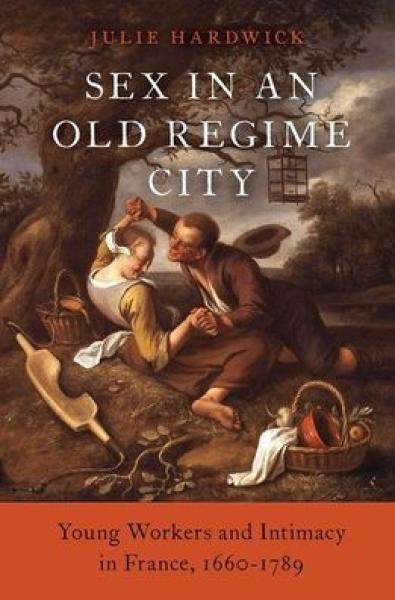Description
In Sex in an Old Regime City, Julie Hardwick offers a major reframing of the history of young people's intimacy. Based on legal records from the city of Lyon, Hardwick uncovers the relationships of young workers before marriage and after pregnancy occurred, even if marriage did not follow, and
finds that communities treated these occurrences without stigmatizing or moralizing. She finds a hidden world of strategies young couples enacted when they faced an untimely pregnancy. If they could not or would not marry, they sometimes tried to terminate pregnancies, to make the newborn go away
by a variety of measures, or to charge the infant to local welfare institutions. Far from being isolated, couples drew on the resources of local communities and networks. Clerics, midwives, wet nurses, landladies, lawyers, parents, and male partners in and outside the city offered pragmatic,
sympathetic ways to help young, unmarried pregnant women deal with their situations and hold young men responsible for the reproductive consequences of their sexual activity. This was not merely emotional work; those involved were financially compensated. These support systems ensured that the
women could resume their jobs and usually marry later, without long-term costs. In doing so, communities managed and minimized the disruptions and consequences even of cases of abandonment and unprosecuted infanticide.
This richly textured study re-thinks the ways in which fundamental issues of intimacy and gendered power were entwined with families, communities, and religious and secular institutions at all levels from households to neighborhoods to the state.
"Based on extensive archival research, the extraordinary stories of ordinary peoples' lives explore many facets of young people's intimacy from meeting to courtship and to the many occasions when untimely pregnancies necessitated a range of strategies that might include marriage but also efforts to induce abortions, arrangements for out of wedlock delivery and custody with the fathers or charging the babies to a foundling hospital or infanticide. Clergy, lawyers, social welfare officials, employers, midwives, wet-nurses, neighbors, family and friends supported young women and held young men responsible for the reproductive consequences of their sexual activity. These practices of intimacy reframe our understanding of multiple aspects of the Old Regime. Their experiences challenge the centrality of the disciplining of female sexuality as a critical early modern project of state formation and religious reformation, the history of a sexual double standard in local and long contexts, the history of marriage, and the role of law in politics writ large and small of communities and institutions. Their lives also reshape many more specific debates, for instance, about the history of emotions, infanticide, attitudes to illegitimacy, pre-modern workplaces, and the body. It reveals the ways in which for working communities local management of intimacy with a heavy emphasis on pastoral care and pragmatic acceptance of the inevitability of out of wedlock pregnancy were the norm"--
"Historiography has come a long way since Foucault and first-wave feminism. In Julie Hardwick's compelling study of youthful intimacy in early modern Lyon, the word 'patriarchy' never even appears. This is not because the city was a sexual utopia...but because our understandings of the early modern
state, law and gender have changed. A royal edict of 1556 against clandestine pregnancy which supported much of the disciplining narrative turned out to be misunderstood by historians and mostly ignored at the time....Her close reading of hundreds of cases reveals not a parade of sexual
transgressions in need of discipline but commonly accepted courtship practices that went wrong.... Far from disciplining young women, then, the Lyon court disciplined men for failing to keep their promises. In so doing they restored women's honour." -- Jan Machielsen, Times Literary Supplement
"A superb reconstruction of a lost world of intimacy and power. Julie Hardwick's absorbing, enriching work reveals the common language of love; the balance of force and caresses in courtship; the pragmatic concerns of marriage; and the solutions to unplanned pregnancies, showing the capacity of
young women and men to shape their own circumstances and tell their stories." -- Laura Gowing, King's College London
"Sex in an Old Regime City explores a topic that seems well beyond the reach of historians: sexual intimacy between urban adolescents at a quarter of a millennium remove. Julie Hardwick's remarkable study is based on the 'archive of reproduction' accumulated around the biological and emotional
consequences of that intimacy -- ranging from pregnancy declarations, paternity suits, notarial documents, doctors' prescriptions, religious injunctions, infant autopsies and hospital archives through to billet-doux and foundlings' tokens. Hardwick's humane and sympathetic eye reveals a richly
delineated world that has poignant continuities as well as contrasts with our own." -- Colin Jones, Queen Mary University of London
"A boldly written and brilliantly researched tour-de-force. Drawing upon meticulous archival work, Julie Hardwick explodes our understanding of what we thought we knew about pregnancy declarations, licit intimacy, and patriarchal discipline and reveals a far more complex system of communal
complicity. Sex in an Old Regime City is a must-read for all scholars of the early modern world, especially those interested in legal, social, and gender history." -- Meghan Roberts, Bowdoin College
"This well-written and impressively researched book sheds important new light on sexual intimacy, reproduction, and marriage among young adults in eighteenth-century France. Stories of the lives and loves of ordinary working people bring their previously inaccessible intimate world to life." --
Clare Crowston, University of Illinois at Urbana-Champaign
Product Details
- Oxford University Press, Brand
- Aug 13, 2020 Pub Date:
- 0190945184 ISBN-10:
- 9780190945183 ISBN-13:
- 296 Pages
- 9.4 in * 6.1 in * 1.1 in Dimensions:
- 1 lb Weight:




